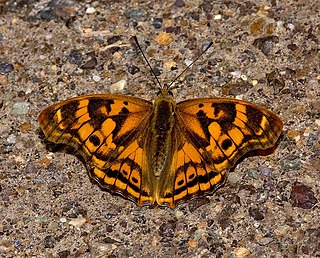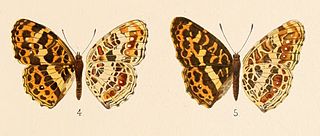Alope was in Greek mythology a mortal woman, the daughter of Cercyon, known for her great beauty.

The dark green fritillary is a species of butterfly in the family Nymphalidae. The insect has a wide range in the Palearctic realm - Europe, Morocco, Iran, Siberia, Central Asia, China, Korea, and Japan.

The poplar grey is a moth of the family Noctuidae. It is found throughout Europe.

Calinaga is the sole genus of the monotypic nymphalid butterfly subfamily Calinaginae. Its species occur in South Asia and Southeast Asia. The evolutionary history of Calinaga remains a mystery until today. Recent research indicated that the common ancestor of Calinaga first split in the Eocene in southern China. This was most likely due to a consequence of geological and environmental impacts of the collision of the Indian and Asian subcontinents.

Friedrich Joseph Adalbert Seitz, was a German physician and entomologist who specialised in Lepidoptera. He was a director of the Frankfurt zoo from 1893 to 1908 and is best known for editing the multivolume reference on the butterflies and larger moths of the world Die Gross-Schmetterlinge der Erde which continued after his death.

Lycaena thersamon, the lesser fiery copper, is a butterfly of the family Lycaenidae. It is found from Eastern Europe, Italy and South-East Europe to Mongolia and North-Western China.

Muschampia tessellum, the tessellated skipper, is a butterfly of the family Hesperiidae. It is found from the southern Balkan Peninsula through Ukraine, southern Russia and Asia Minor, southern Siberia, Mongolia, east to the Amur region.

Euxoa conspicua is a moth of the family Noctuidae. It is found in Portugal, Spain, Andorra, France, Italy, Corsica, Crete, Cyprus, Romania, Bulgaria, Greece, Ukraine and southern and eastern Russia, east to China and northern India. It is also present in the Levant.

Araragi enthea is a small butterfly found in the East Palearctic that belongs to the lycaenids or blues family.

Aricia chinensis is a small butterfly found in the East Palearctic that belongs to the lycaenids or blues family.

Celastrina oreas is a small butterfly found in the East Palearctic that belongs to the lycaenids or blues family.

Chrysozephyrus smaragdinus is a small butterfly found in the East Palearctic that belongs to the lycaenids or blues family.

Carterocephalus dieckmanni is a species of butterfly found in the East Palearctic that belongs to the skippers family.

Argynnis zenobia is a butterfly found in the East Palearctic that belongs to the browns family.

Apatura laverna is a butterfly found in the Palearctic that belongs to the emperors group within the brushfooted family. It is endemic to China.

Araschnia doris is a butterfly found in the Palearctic that belongs to the browns family. It is endemic to West and Central China.

Araschnia oreas is a butterfly found in the Palearctic that belongs to the browns family. It is endemic to East Tibet and West China

Athyma disjuncta is a butterfly found in the Palearctic that belongs to the browns family. It is endemic to China

Calinaga lhatso is a butterfly found in the Palearctic that belongs to the browns family (Nymphalidae). The species was first described by Charles Oberthür in 1893. It is endemic to China.

Athyma punctata is a butterfly found in the Palearctic that belongs to the browns family. It is endemic to China.

















